After an awards season that awarded all the same actors, we want to give some appreciation to 2017’s most overlooked performances. Read the rest of our best of the year content here.

As much as we adore performances like Saoirse Ronan’s in Lady Bird or Timothée Chalamet’s in Call Me by Your Name, awards season always ends up forgetting some of the year’s very best work. What’s more, actors in supporting roles, who aren’t as heavily in the spotlight, often get dismissed entirely for their brief screen time. As we wrap up our best of 2017 coverage, we’re celebrating 21 of the lead and supporting performances that have been largely forgotten — even though their films wouldn’t be the same without them.
LEAD PERFORMANCES FROM 2017
Honourable mentions
Zoey Deutch (Before I Fall), Takuya Kimura (Blade of the Immortal), Bel Powley (Carrie Pilby), Anne Hathaway (Colossal), Alec Secareanu (God’s Own Country), Jared Abrahamson (Hello Destroyer), Adam Driver (Logan Lucky), Riley Keough (Lovesong), Cate Blanchett (Manifesto), Rachel Weisz (My Cousin Rachel), Mylène Mackay (Nelly), Rebecca Hall (Professor Marston and the Wonder Women), Carmen Ejogo (Roman J Israel, Esq.), Julianne Nicholson (Sophie and the Rising Sun), Ariane Labed (The Stopover), Rosamund Pike and David Oyelowo (A United Kingdom)
Jason Ritter, Bitch
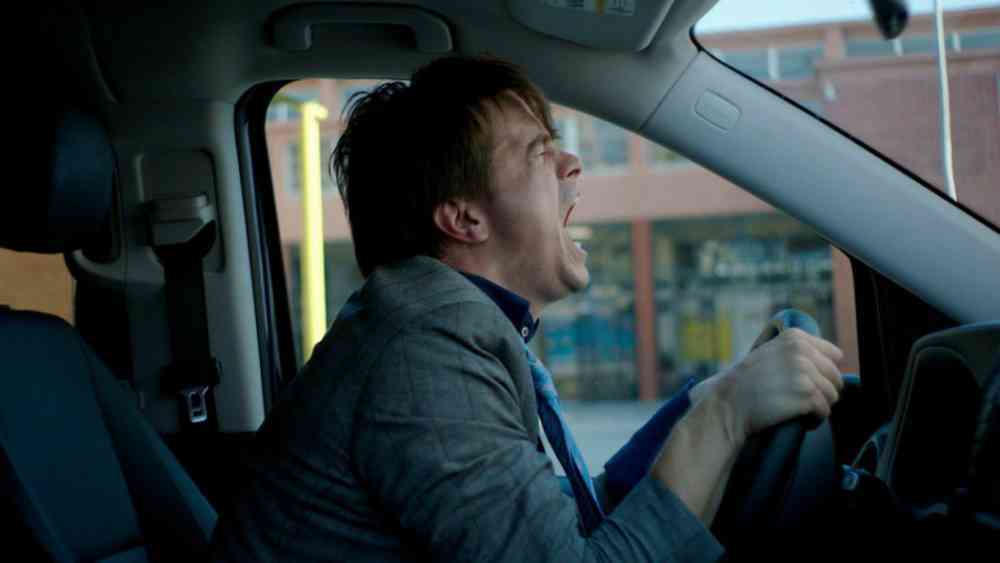
Beyond Bitch’s wild premise — a woman turns into a dog in response to her husband Bill’s (Jason Ritter) neglect — one of its most surprising feats is Jason Ritter’s lead performance. Ritter honestly and empathetically plays both his character’s initial awfulness and his eventual mellowing, executing a redemption arc that is both convincing and sympathetic. He starts the film as a complete asshole: he ignores his wife (played by director Marianna Palka), speaking to her either in a light and dismissive tone, or with strained aggravation. Ritter leans into all of his character’s worst attributes, strutting around cockily and showing no signs of hesitation or remorse in his affair with a coworker.
That all changes when his behaviour causes his wife to break down, and he is left in charge of their four children; Ritter turns from the film’s villain to its protagonist. As his life spirals out of control, after being forced to shoulder some responsibility, Ritter demonstrates brilliant comedic timing. Bill is at his most manic early on, when we see him tackle the school run for the first time, while running late for work. Ritter throws himself into this sequence physically, sprinting back and forth, sweating, screaming, falling over, and pausing to take it all in, before running off again in a mad dash. After the way we’ve seen him behave towards his family, we’re happy to have a reason to laugh at him.
But as his torture persists, Ritter shows us the humanity in his character and earns our sympathy. He opens up to those around him and comes to understand the damage he’s caused. Ritter begins to engage more fully with his fellow actors, listening to them and responding thoughtfully, rather than acting dismissive or looking at his phone as Bill used to. He softens, demonstrating that even despicable people have the capacity for growth. – Orla Smith
Arnaud Valois and Nahuel Pérez Biscayart, BPM (Beats Per Minute)
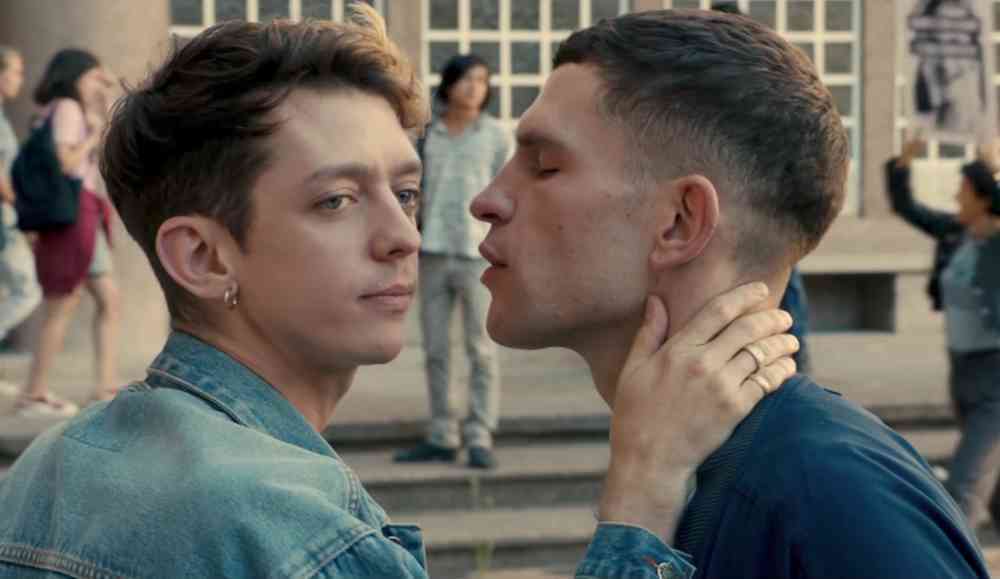
Robin Campillo’s latest film, BPM, unfairly left out of the Foreign Oscar race, is an ensemble film that never reduces its characters to clichés — a feat most remarkable in the leads, Nathan (Arnaud Valois) and Sean (Nahuel Perez Biscayart). Both are gay men and members of the Paris chapter of ACT UP (the AIDS Coalition To Unleash Power), yet their personalities — and, with it, their approach to dealing with homophobia — are polar opposites. Nathan is quiet and reserved, his character mysterious and his opinions often hidden, while Sean is boisterous and energetic, proudly affirming his sexuality despite the consequences this often entails.
Biscayart makes clear that even Sean’s affirmation of his authentic self is sometimes performative. One wonderful sequence hints at the way his irreverence and enthusiasm are also born out of a deep empathy for others. After an emotional discussion about how the threat of losing his life to AIDS pushes him to live every day to the fullest, Sean’s poignant whisper turns into snark as he casually retracts and says he was just joking, letting his listeners off with a comforting chuckle.
Everything in Nathan’s and Sean’s widely differing attitudes in public feels a little bit exaggerated, but always in a profoundly self-conscious manner. The way they glance at each other at meetings or during protests is obviously part of their flirting, but it is also a sign of mutual recognition — each can see that the other is playing a bit of an act that they know doesn’t exactly fit who they are in private, in bed. After all, only in movies do people act the same by themselves as they do with other people. But when they are alone together, the two lovers do not seem so different anymore.
[clickToTweet tweet=”‘Only in movies do people act the same by themselves as they do with other people. But in BPM, when Valois and Biscayart’s two lovers are alone together, they do not seem so different anymore.'” quote=”‘Only in movies do people act the same by themselves as they do with other people. But in BPM, when Valois and Biscayart’s two lovers are alone together, they do not seem so different anymore.'”]
With their identity in constant movement, Sean and Nathan feel incredibly realistic. But in exposing the performative nature of being, Valois and Biscayart fuse the illusion of film — they are playing characters in a movie — with the illusion of identity. – Elena Lazic
https://seventh-row.com/2017/10/09/robin-campillo-bpm-beats-per-minute/
Anne Heche and Sandra Oh, Catfight
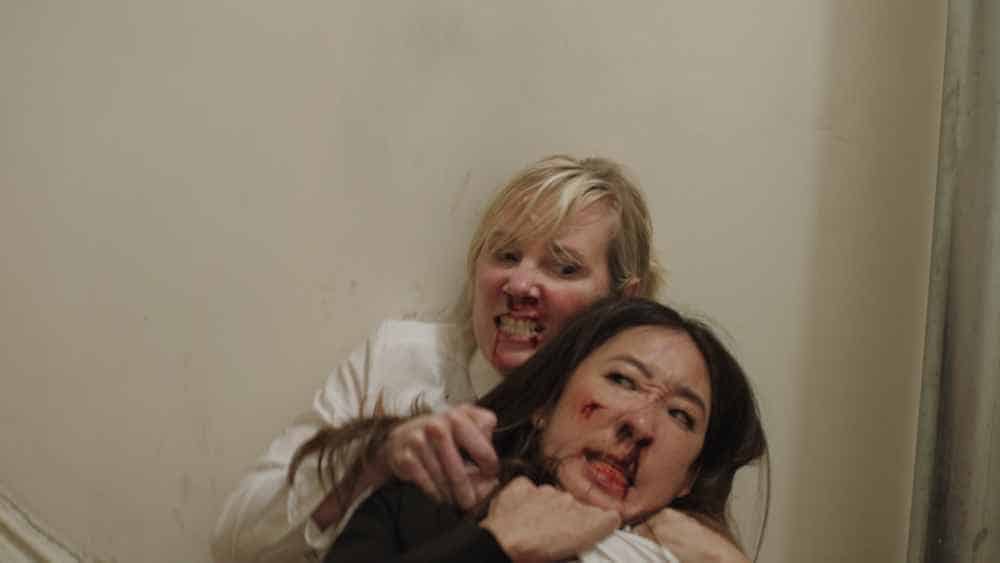
At the centre of Onur Tukel’s scathing satire, Catfight, is a pair of utterly committed, vicious, and versatile comedic performances from Sandra Oh and Anne Heche. Former high school friends Veronica (Oh) and Ashley (Heche), now estranged and middle-aged, are two of the most challenging and exciting roles an actor could be offered. Each character changes dramatically over the course of six years, impacted by sudden and dramatic shifts in the social, economic, and political climate of their own lives and the world as a whole. Tukel directs to a highly specific comedic tone, playing the jokes straight while still maintaining an air of lightness. It’s a delicate balance, and one misjudged performance could deflate the entire thing.
Oh and Heche, however, are completely in sync with their director and each other. They bring out the ridiculousness in their characters’ behaviour: Oh starts the film as a rich, bored, alcoholic housewife, acting polished and stuck-up. When she’s drunk, her accent becomes more nasal and Californian, the upward inflections in her voice high and squeaky as Veronica loosens up enough to mock the fakery of the life she lives. Heche begins as a starving artist, trying to sell the pretensions of her abstract art to potential buyers. Years of trying and failing has clearly worn down her conviction in her own work, and her half-committed pitches and secret eye rolls at her client’s art-speak, allow us to laugh at the absurdity of her fickle industry.
Veronica and Ashley present themselves very differently as they progress through the years, but Oh and Heche still ensure they are recognisably the same characters. Ashley’s frustration at her lack of success, which manifests in sarcasm, sighs, and tight-lipped stares of contempt, turns into dominating aggression when her art starts to sell. Oh’s drunken scepticism of her vapid lifestyle, and the softness in her voice when she talks to her son, makes it easy to believe that she would be humbled by losing everything, including him. Because both actresses play the comedy so straight, it allows them to build believable characters and create moments of sincere drama. We may spend most of the film laughing, but when Veronica breaks down as she takes in the loss of her son, her heartbreak feels genuine and moving.
Oh and Heche’s performances are impressive for their portrayal of how people alter and restrain their presentation of themselves depending on where they stand in life. When they eventually come to physical blows, though, they’re given the freedom to not hold back, channelling their characters’ most primal instincts and rage. – OS
Rooney Mara, A Ghost Story
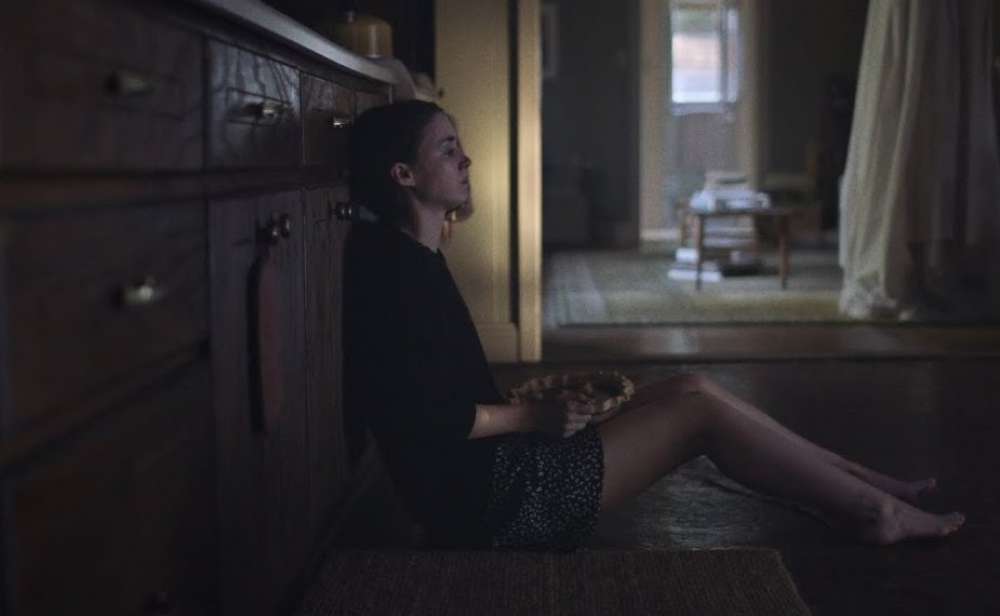
‘Rooney Mara eats a pie in this movie’ was the main takeaway from A Ghost Story’s initial set of glowing reactions out of Sundance. It’s an absurdly everyday action that gained mythic status throughout the year, so much so that ‘the Rooney Mara pie-eating movie’ became just as helpful a descriptor as the film’s title. But Mara’s work in that scene, not to mention the entire film, shouldn’t be reduced to a joke. It’s one of the quietest, most internalised performances of 2017.
After Mara’s character, named only M, loses her husband to a car accident, we spend a lot of time watching her alone. She wanders around her house, taking in his absence. Mara doesn’t play up to the camera, internalising M’s grief until it’s barely detectable to an outside observer. She goes about everyday activities, like washing the dishes — but we recognise the weight of her grief in the way she occasionally stops in her tracks, breathes in heavily, then continues robotically, as if only functioning due to necessity rather than willpower.
[clickToTweet tweet=””The Rooney Mara pie-eating movie’ became just as helpful a descriptor as A GHOST STORY’s title. But Mara’s work in that scene, not to mention the entire film, shouldn’t be reduced to a joke.'” quote=””The Rooney Mara pie-eating movie’ became just as helpful a descriptor as A GHOST STORY’s title. But Mara’s work in that scene, not to mention the entire film, shouldn’t be reduced to a joke.'”]
Director David Lowery shoots much of the film in static wide shots, held for a long time, within which Mara is able to move freely and play scenes out naturally. The infamous pie scene is roughly five minutes long. Mara is crouched on the floor, moving very little, yet each bite has a new meaning: she attacks the pie with anger, stabbing it so that her fork hits the bottom of the tin — but that turns to a slower desperation, which slows again to resigned, methodical determination. In between each bite, there’s often a sense of deflation or hopelessness; she stops, sinks slightly, and then carries on, sniffling quietly. It’s an uncannily intimate portrait of grieving while alone. – OS
Olivia Cooke, The Limehouse Golem

Olivia Cooke might just about convince you that the dull and lifeless The Limehouse Golem has something to it. As the protagonist, Lizzie, she’s a constantly compelling presence, single-handedly bringing purpose to the narrative.
For much of the film, Lizzie appears to be a determined, wide-eyed innocent, who discovers her flair for performance by working in a Victorian London theatre, modeled on the famous Grand Guignol. As soon as she gets on stage, she radiates charisma and confidence. The joy on her face, as she discovers something she loves doing and is good at, is cheer-inducing.
Cooke’s open expressivity allows us in: we feel privy to Lizzie’s thought processes as she decides what to do and who to trust. The film’s final twist disappointingly explains away Lizzie’s eventual criminality as insanity, but Cooke’s performance up until then could be part of another, better film: one where Lizzie’s emotional journey is understandable even if her morality is dubious. Throughout the film’s timeline, as Lizzie climbs in social class, her cockney accent is replaced with RP. Fame and fortune bring paranoia, which Cooke embodies by holding herself with self-conscious poise; Lizzie is increasingly fearful of others and aware of how she appears now that she’s a target with a lot to lose. She’s on the edge, and we’re right there with her. – OS
Claes Bang, The Square

In Ruben Ӧstlund’s Palme d’Or winner, The Square, Claes Bang plays Christian, a man who has reached his position as the chief curator of a fancy art gallery with a little talent, and a lot of privilege. Rather than face the consequences of his actions, Christian usually shies away from them or finds false excuses, hollow apologies — the classic “I’m sorry you feel that way” could be his motto — and waits for the furore to die out. Claes Bang’s natural charm, kind face, and constant look of naivete fit with the role of Christian like a glove. More than that: they help complete it, and what could have been a flat, two dimensional character is a fully-fledged, lived-in protagonist.
The nonchalance in Bang’s movements; even the somewhat rehearsed way he smiles — every detail in his performance gives crucial context to his character’s actions: his behaviour clearly indicates his privilege as a straight, white, upper-class man who has never had to prove his worth to anybody. Through a very carefully calibrated performance, Bang manages to charm us all while conveying Christian’s utter vapidity and hypocrisy. Although his air of cheeky mischievousness can be very cute, a closer look reveals it for the carefully polished shield behind which Christian hides all his lies and betrayals.
In The Square, this shield is ultimately too small for Christian to conceal his total lack of consideration for others. The fact that he ends up having (perhaps) killed a lower-class child with his own hands might feel like overstated social commentary. But by the time the film reaches this dramatic ending, Bang’s spot-on performance has exposed Christian’s naivety and selfishness, and this conclusion feels like the only possible outcome. – EL
https://seventh-row.com/2017/10/25/ruben-ostlund-square/
Gemma Arterton, Their Finest
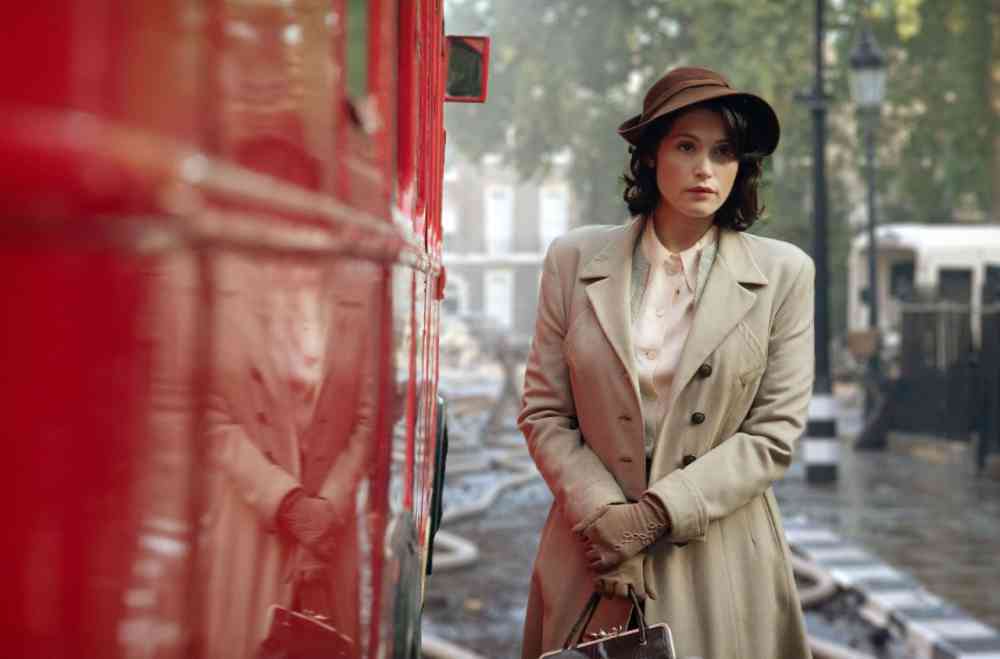
Gemma Arterton’s stars in Their Finest as Catrin Cole, an aspiring secretary-turned-screenwriter who learns to be the leading lady of her own story. It’s the kind of performance that’s incredibly hard to get right, yet rarely get recognition for its greatness. Catrin has to be believably independent-minded enough to follow her lover from Wales to London, without getting married — but insecure enough to need to craft lies about their wedding. She’s enough of a free spirit to follow her heart, and yet eminently practical in her interest in getting a job to support herself. When her partner suggests they’ll have to move out of London because he can’t afford it, she replies, “but I earn”, aware enough of her value to push back, but not enough to see through her partner’s inherent self-absorption and cruelty — not yet, anyway.
[clickToTweet tweet=”‘In THEIR FINEST, Gemma Arterton gives the kind of performance that’s incredibly hard to get right, yet rarely get recognition for its greatness.'” quote=”‘In THEIR FINEST, Gemma Arterton gives the kind of performance that’s incredibly hard to get right, yet rarely get recognition for its greatness.'”]
When Catrin gets a job writing the women’s dialogue for Britain’s WWII propaganda films, she starts to grow into herself. Whether it’s verbally sparring with her mentor and writing partner Buckley (Sam Claflin) — who’s smart enough to be worth her time, but not as clever as she is — or standing her ground about the need to craft female characters who can think for themselves, she has to be believably steely. But Buckley also walks all over her at the beginning, as do her other colleagues, and we have to believe she’d let them as she starts to find her way. Moreover, Catrin has to be believably of her time, which is why she speaks in quiet, polite tones, even as she’s clearly running the show: she knows that, as a woman, she can’t be too aggressive.
Catrin’s main arc in the film is learning how to value herself, how to fight for what she wants, and how not to be pulled down by selfish misogynists. She has to emerge at the other end believably transformed — more self-assured, more herself — while still clearly being the same woman we met at the beginning of the film. Arterton is in almost every scene, surrounded by eccentrics like Bill Nighy’s egotistical faded star and Jake Lacy’s extremely polite RAF pilot who cannot act, and yet she has to be the main person we’re rooting for. Even though she is, essentially, the straight woman to all these characters, she never fades into the background. We’re with her every step of the way. And that takes enormous talent and courage. – Alex Heeney
Interview: Director Lone Scherfig discusses directing actors in Their Finest
Rooney Mara and Ben Mendelsohn, Una
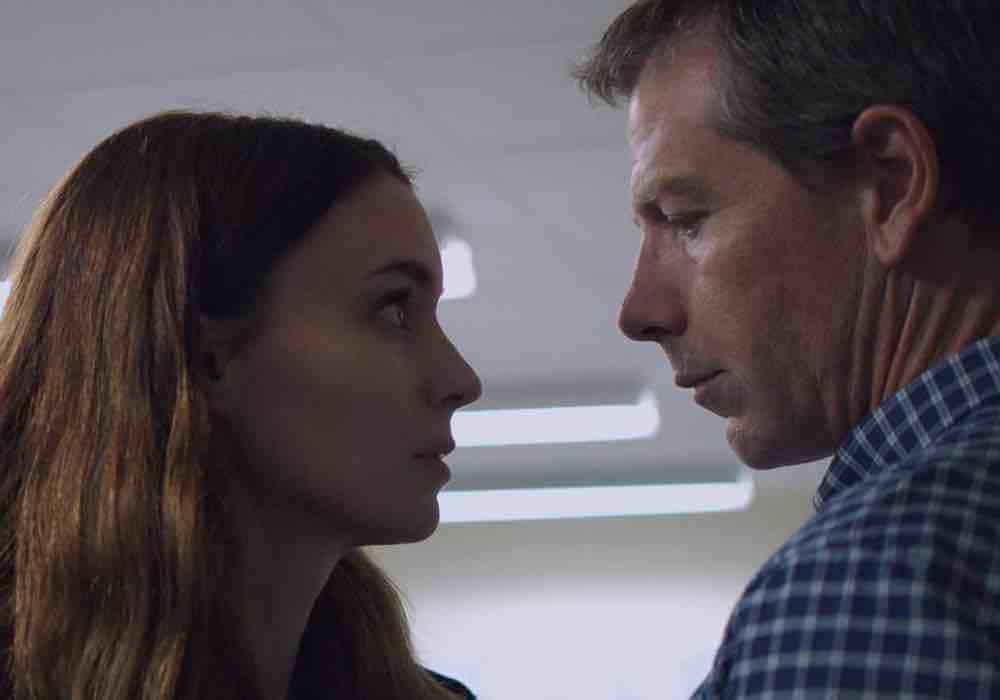
The majority of Una is a thrilling pas-de-deux between twentysomething Una (Rooney Mara) and middle-aged Ray (Ben Mendelsohn), the man she had an affair with when she was just twelve. Mendelsohn plays Ray as a man struggling to do the right thing, and yet suspiciously seedy enough to be guilty of child molestation. He spends the film trying to weasel his way out of the confrontation, as if Una is imposing on him. He shifts from seemingly decent and changed, to deeply vulnerable to this woman with whom he was once intimate, and yet quietly manipulative all at once. It’s a careful balancing act, and he pulls it off brilliantly.
Mara, for her part, is in nearly every present day scene and has to walk a thin line as a damaged, traumatized woman who insists on not being seen as a victim. We watch her trying to rewrite her history with Ray, coming onto him, seducing him, trying to talk to him like equals and ex-lovers, in a way she couldn’t as a child: if she can consent now, can that erase the time when she was too young to do so? Similarly, in her interactions with Riz Ahmed’s Scott, she has to play up the damaged woman in need of saving, as a way of getting his sympathy, while revealing to us, ever so slightly, that she may be deliberately and quietly manipulating him.
[clickToTweet tweet=”‘In UNA, Mara and Mendelsohn craft the quiet complicity of people who have shared a deeply personal secret that only the other one can understand.'” quote=”‘In UNA, Mara and Mendelsohn craft the quiet complicity of people who have shared a deeply personal secret that only the other one can understand.'”]
Together, Mara and Mendelsohn craft the quiet complicity of people who have shared a deeply personal secret that only the other one can understand. At the same time, they’re constantly separated by the years spent apart and the damage done to each other. They shade their characters with enough ambiguity that we’re constantly questioning how much of an active role Una played in their relationship, how much she was taken advantage of, what a confrontation now can achieve, and whether either of them has been changed by what happened. It’s thrilling, complex, and subtle work. – AH
Benedict Andrews talks Una and directing for the stage vs. screen part 1
SUPPORTING PERFORMANCES FROM 2017
Honourable mentions
Andrea Riseborough (Battle of the Sexes), Jason Mitchell (Detroit), Anika Noni Rose (Everything, Everything), Ian Hart (God’s Own Country), Tracy Letts and Lois Smith (Lady Bird), Emma Thompson (The Meyerowitz Stories), Rob Morgan (Mudbound), Rebecca Spence (Princess Cyd), Margo Martindale and Lorraine Toussaint (Sophie and the Rising Sun), Miranda Richardson (Stronger), Oscar Isaac (Suburbicon)
Elle Fanning, The Beguiled

The Beguiled, Sofia Coppola’s gauzy tale of a Virginia girls’ school that takes in a wounded Union soldier during the Civil War, played to mixed reviews. But amid the dreamy cinematography and rustling 18th century skirts, one supporting character felt refreshingly familiar: Elle Fanning is deliciously hateable as the odious Alicia, a preening beauty whose curiosity and conniving propel the plot.
With few lines and no backstory, Alicia could easily be a stock character, a would-be teen seductress making eyes at the wounded Corporal McBurney. But Fanning steals the screen by portraying Alicia as a young woman aware of her charms and eager to test them out.
Fanning’s body language illustrates Alicia’s number one priority: their wounded houseguest. Fanning plays Alicia as hilariously useless — while her fellow students tend to the garden that feeds them, Alicia prods the earth halfheartedly with a shovel or gives up to nap in the sun. But Alicia snaps to attention in McBurney’s presence, her eyes tracking his movements around the room, though the rest of her body remains still (providing plausible deniability if anyone should chance to observe her). This shift in Fanning’s alertness also signals a shift in Alicia’s narrative role, from comic relief to serious plot-mover. The way Fanning scrutinizes McBurney and attempts to disguise that scrutiny from others betrays Alicia’s craftiness and hunger for something forbidden.
Alicia’s problem isn’t empty-headedness — in fact, she’s just a little too clever for her own good. We recognize her by the way she critically examines her own face in the mirror, unsmiling, as though it belonged to someone else. Fanning’s Alicia doesn’t see herself as beautiful: she sees herself as powerful, and she wants proof. It’s her bad luck that she tries to kid a kidder. Corporal McBurney is playing the same game himself. – Mary Angela Rowe
Amira Casar, Call Me by Your Name
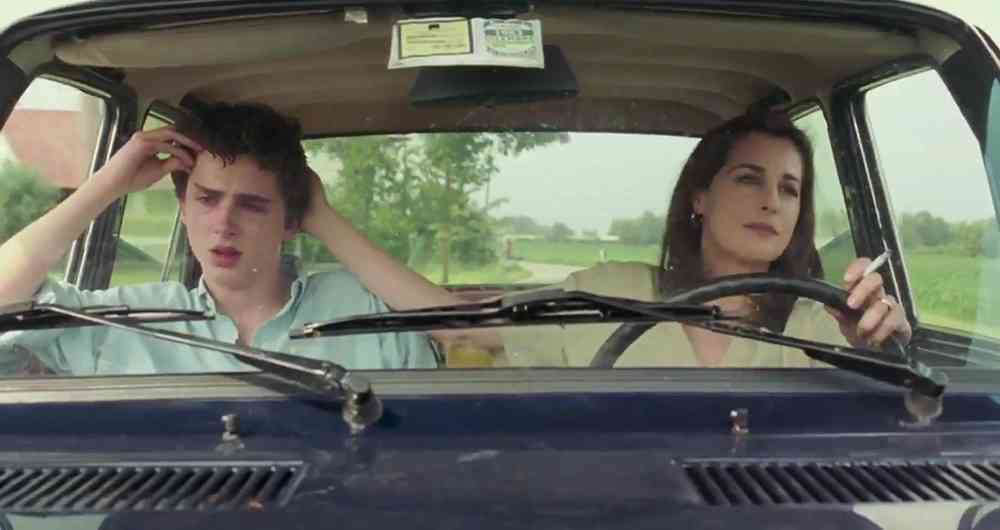
Call Me by Your Name is moving not just because of its central summer romance, but because of the steady, loving support system around teen protagonist, Elio (Timothée Chalamet). Much has been made of Michael Stuhlbarg’s now iconic father-to-son monologue, but Amira Casar’s maternal presence as Elio’s mother, Annella, is just as vital. Casar holds herself with immense poise and self-assurance, striding around the Italian villa where she has command over the garden and the maids, remaining mostly in the background but performing even menial tasks with a flourish. But while she doesn’t interfere in Elio’s romance with Oliver (Armie Hammer), watch her at any moment and you’ll notice glances at her son that are both sly and affectionate. We see her recognise a resilience in him that, in his fragile state, he’s not yet aware of.
When Annella is with Elio, we’re afforded moments that demonstrate her closeness with her son. While she reads to him, he lays across her lap and she runs her hand through his hair absentmindedly. There’s an easy intimacy between them, a purely loving familial bond free of antagonism, built on the bedrock of Elio’s charmed childhood. She knows her son better than anybody, and her knowing glances at Elio and Oliver are evidence that she’s an outside observer just like us, aware of everything that’s going on between the two of them and what it means for Elio.
She is a source of strength and comfort that Elio takes for granted but can fall back on when he deals with the heartbreak of losing Oliver. After Oliver leaves, Elio breaks down in the car in front of his mother. Casar makes no grand gesture of love and support, instead lightly tousling her son’s hair, keeping her eyes on the road, and saying nothing, just letting him know that she’s there. There’s a look of sad resignation on her face: she wants to comfort her son, but knows she has to give him the space to feel and heal on his own. – OS
Read our Special Issue on Call Me by Your Name here >>
Aneurin Barnard, Dunkirk

As one of the more seasoned actors among the young soldiers in Dunkirk, it should come as little surprise that Aneurin Barnard regularly steals the show. Like co-star Jack Lowden, he already has an Olivier Award under his belt, as well as several TV series and small films. But what Barnard does here is nothing like the musical theatre he made his name on, or the many wet sops he’s played on television. In Dunkirk, he barely utters a word, and there’s no exposition to contextualize his character. Through sheer physicality, and a keenness in his eyes that reveals his thinking, he imbues his character with a rich history that goes above and beyond the meagre characterization in the script.
Vitally, we see him make decisions and think things through. When he first meets Fionn Whitehead’s character on the beach, they size each other up, and decide to work together. From the way Barnard scans his surroundings, looking for a means of skipping the lines to escape the beach, we can tell he’s resourceful, which is probably how he’s survived this long. Even when he gets on the boat, he doesn’t follow the crowd downstairs; instead, he’s searching for exits, suggesting he understands the dangers his colleagues don’t, because he’s been through something similar before.
His desperation is apparent from the start: we meet him zipping himself into somebody else’s uniform, already aware that he has to take advantage of the resources available to him. But his humanity is apparent, too: at each step of the journey, Barnard locks eyes with Whitehead, keeps track of him, and works with him to keep them both alive. – AH
Queen Latifah, Girls Trip
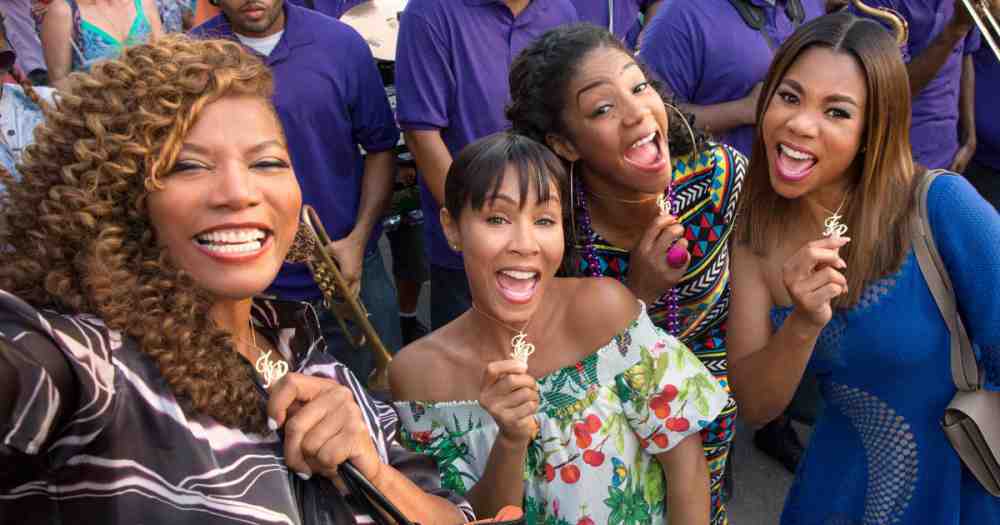
The massive critical and commercial success of Girls Trip last summer was largely due to its excellent ensemble cast and their effortless chemistry. Tiffany Haddish’s breakout comedic turn as the outrageously wild Dina has been the most lauded, but Queen Latifah deserves just as much recognition for her role as ex-journalist, now celebrity gossip blogger, Sasha, the grounding presence in the group.
[clickToTweet tweet=”‘If Dina in GIRLS TRIP is the friend who’s reliably the life and soul of the party, then Queen Latifah’s Sasha is quietly the glue that keeps everyone together.'” quote=”‘If Dina in GIRLS TRIP is the friend who’s reliably the life and soul of the party, then Queen Latifah’s Sasha is quietly the glue that keeps everyone together.'”]
If Dina is the friend who’s reliably the life and soul of the party, then Sasha is quietly the glue that keeps everyone together. Sasha is calm and collected, grounding the film in reality — although she’s still very willing to let go and have fun. Latifah’s gait is slow and assured, exuding utter comfort in her own skin. Her comedic one-liners aren’t exuberant, but delivered with effortless ease, like they’re second nature. Above all, there’s great warmth and affection in the way she looks at her friends, enjoying their rare reunion for all it’s worth. – OS
Andrew Scott, Handsome Devil
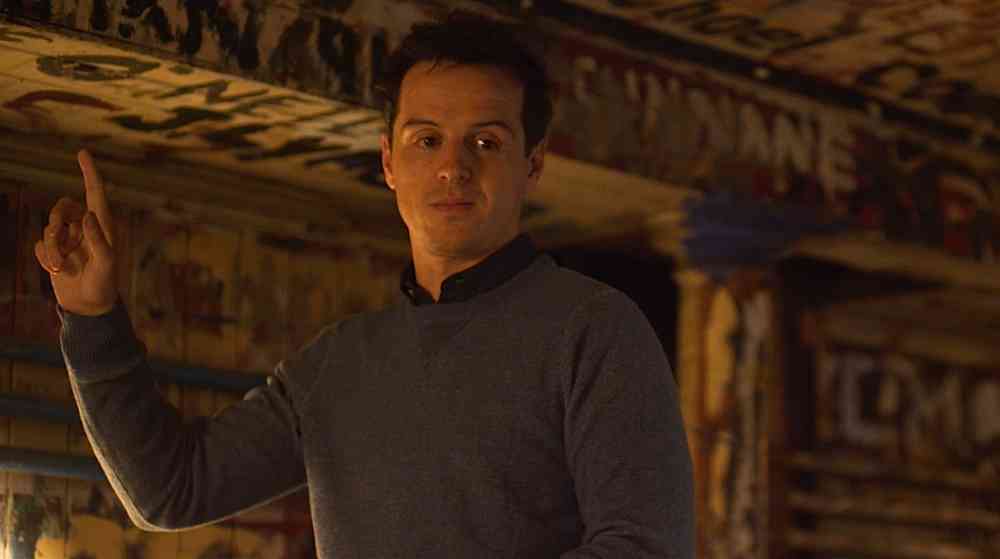
In Handsome Devil, Andrew Scott plays the English teacher you wish you had. We see his character outside of a classroom context, in a more casual setting — but when he’s in class, he adapts himself to present to his students. His words sound throwaway, as if to feign disinterest, and he often treats his students with mocking exasperation both to challenge them and o put them in their place. It’s clear that he’s invested in every one of his students by how swiftly he responds to whatever they throw at him, and how he throws himself fully into each lesson, moving about the classroom and down past the rows of desks, sometimes angrily snapping at the class with sudden intensity. His mind seems to be nowhere but in the lesson.
But Scott shows how teachers are constantly acting, calculating their in class personas to best reach their pupils. He expertly balances his character’s presentation as a real man and as a working professional. He’s a dream teacher because Scott ensures his personhood is just slightly visible beneath his professionalism, so that his students don’t just feel like they’re listening to a robot and are therefore willing to engage.
At the same time, we see how precarious his command over his pupils is, and how uncomfortable he feels when his image is jeopardised. When he’s threatened with being outed as gay, in a school where his students are constantly exhibiting homophobic behaviour, Scott’s fear is visible, even though he tries to pass it off as his usual nonchalance. He avoids eye contact with his students, his voice less certain and relaxed. Suddenly, he’s hesitating when he speaks. His class no longer sees him as a man in control. – OS
Christine Woods, I Don’t Feel at Home in This World Anymore
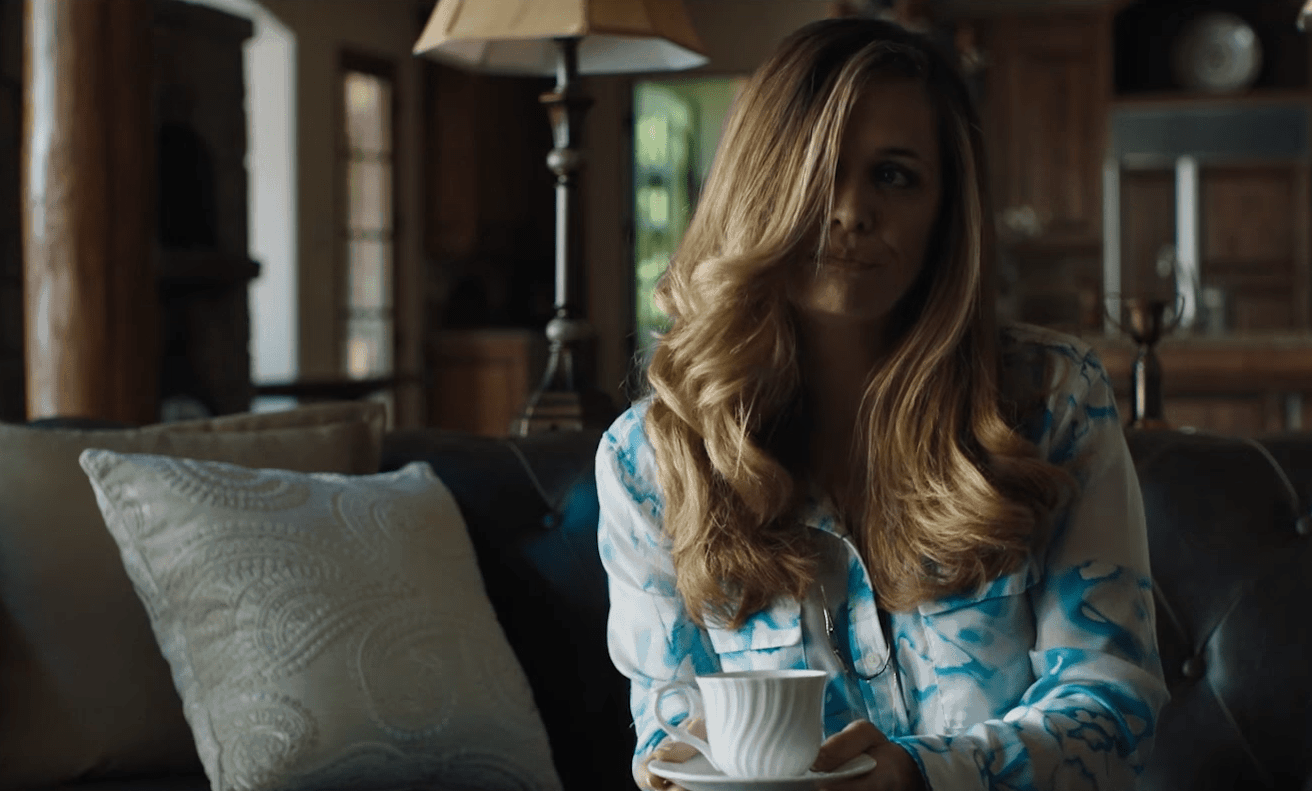
Although her character is introduced only to provide filler and exposition, Christine Woods’ brief performance in I Don’t Feel at Home in This World Anymore is just as entertaining as the primary revenge plot. Woods’ character, the wife to the film’s main villain, is a comically chipper and hospitable southerner, with a thick accent and a smile so wide that it looks almost painful. Her energy is so outsize, her character so ch atty and over-enthusiastic, that she draws all the attention away from the film’s two leads (Melanie Lynskey and Elijah Wood), with whom she shares her scenes.
Woods earns her biggest laughs from the contrast between this exaggerated, caricatured manner and the aggravated, bored woman underneath. It’s all just a performance put on by a housewife going stir-crazy: her wild-gesticulating and high-pitched laughter is absurdly over-the-top, and frequently shows cracks. Despite the fact that she’s home alone, she answers the door midway through a laugh, so starved of company that she overdoes her welcoming attitude to a hilarious degree — which jars completely with the fed-up, dead look in her eyes. When asked to speak on her husband’s whereabouts, the chasm between her chipper manner and her underlying annoyance grows even vaster, her expressions and voice becoming noticeably strained, bitter, and almost manic. Lynskey and Wood are left to gawk in alarm, their objective to solve a mystery briefly forgotten by the sheer force of Woods’ presence. – OS
Nicole Kidman, The Killing of a Sacred Deer
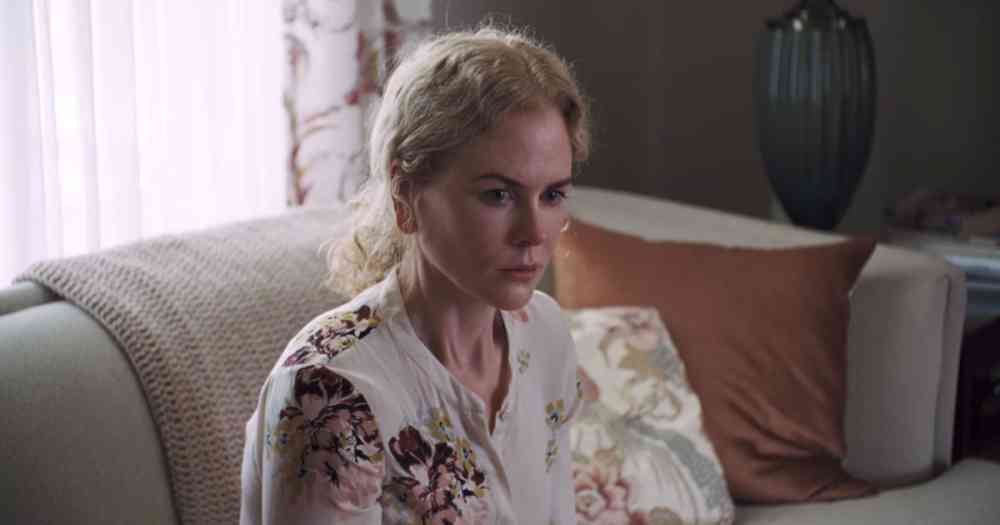
Yorgos Lanthimos’ films demand a certain kind of stylized acting: speak in a monotone, don’t emote, just read the lines. Even the most banal dialogue is designed to be read as deadpan. As the matriarch in The Killing of a Sacred Deer, Nicole Kidman proves she can fit in Lanthimos’ world, and yet still come out as a living, breathing, emoting character. Each of her lines is shaded with meaning. Even though she maintains that even, steady tone that Lanthimos demands, you could imagine her speaking her dialogue in a more realist world, too, because her performance doesn’t feel stylized. It’s what allows her to deliver golden zingers that are at once hilarious but also reveal the emotional life of the woman delivering them. – AH
Alicia Silverstone, Killing of a Sacred Deer

It’s criminal that, in the more than two decades since Clueless, Alicia Silverstone hasn’t had another part worthy of her prodigious talents: ace comic timing, a charismatic screen presence, and the ability to shade all of this with palpable vulnerability. Although she only appears in one scene in The Killing of a Sacred Deer, as the mother of the teenage antagonist, Martin (Barry Keoghan), she left an indelible impression.
[clickToTweet tweet=”‘Here’s hoping this is the start of the Silverstonaissance.'” quote=”‘Here’s hoping this is the start of the Silverstonaissance.'”]
Silverstone masters the timing of Lanthimos’ trademark deadpan dialogue, getting the highest density of laughs of anyone in the film. At the same time, she crafts a portrait of a lonely woman just looking for a sexual connection, a doting mother, and a somewhat sinister presence for her inability to see her very creepy son as anything but angelic. It made me want to see more of her in this film, and indeed, in film more generally. Here’s hoping this is the start of the Silverstonaissance. – AH
David Troughton, The Levelling
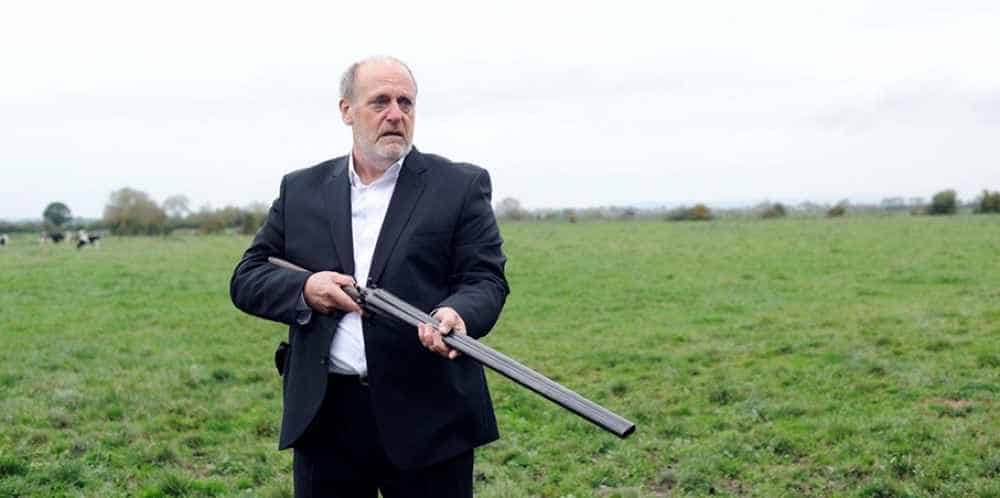
As The Levelling is told almost entirely from the perspective of protagonist Clover (the tremendously talented Ellie Kendrick), it’s easy to miss the complexity and nuance of David Troughton’s performance as her father, Aubrey. In the wake of her brother’s suicide, Clover shows up on the family farm, angry at her father, whom she calls by his first name. Troughton is physically big enough that we can see how he could be a threatening presence, but he moves about as if he has to lug his own weight, carrying on when he’s got little left to live for.
Aubrey and Clover have been estranged for years, and while Aubrey isn’t exactly welcoming — he hugs everyone but his daughter, for whom he rarely has a kind word — there’s a lot of restraint in his behaviour. He speaks softly and gently, avoids picking fights as much as he can, and doesn’t take Clover’s bait for a fight. When he matter-of-factly tells her to put on her wellies to help him milk the cows, she’s frustrated by his audacity. But from the way he calmly and carefully helps her with her work, even with a bit of pride, we can see that he only wants a chance to spend time with her, but doesn’t know how to ask.
The damage between Aubrey and Clover has been primarily caused by an inability to communicate their feelings: their estrangement was cemented when Clover was just 18, so it was really Aubrey’s responsibility. He thought he was sending his daughter off to boarding school where she was happy and thriving; she thought she had been abandoned. He thought he was setting her free by letting her go off to university; she only saw the anger with which he did it. Troughton embodies all of this history; the resignation in his lumbering gait is heartbreaking. Like Clover, he’s trying desperately to keep it together, because he can’t cry, and he can’t stop carrying on with the day-to-day. But now and then, Troughton lets us see the softie inside, as he looks at his smiling daughter with wonder and pride. He even notes she’s a chip off the old block — annoyingly, because it’s why they fight, but also gloriously, because it’s something to admire.
It would be easy to make Aubrey a toxic villain: Clover is rightfully angry at him for much of the film. But Troughton forces us to see the human in his character. His occasional outbursts show the capacity for scary anger, but for the most part, he remains calm, standoffish only because he doesn’t know how to engage more positively. What comes through is a man who deeply loves his daughter, who is ashamed of his behaviour toward both of his children, and who pushes people away because he doesn’t know how to heal. Fortunately, director Hope Dickson Leach let us live with that complexity, which is where the heart of this father-daughter story lives. – AH
Interview: Hope Dickson Leach discusses her astonishing debut The Levelling
Jake Gyllenhaal and Tilda Swinton, Okja

In Okja, Jake Gyllenhaal embodies, with pantomime flair, a coked-up manic, two-faced media figure. His has-been children’s TV presenter Johnny Wilcox is a caricature, yes — but watching Gyllenhaal knowingly embrace that and completely commit to utter insanity was one of my greatest cinematic joys in 2017.
Johnny first appears, wheezing and panting, from the horizon of the Korean mountains where he has come to visit the super-pig of the film’s title. The chasm between the Gyllenhaal star persona we know and his character is automatically hilarious: Johnny walks like he’s still learning how to work his limbs, and he speaks in a nasal squeal. He only reverts to the actor’s own natural accent and demeanour when he’s being filmed by the camera crew he’s brought along with him to the mountains.
[clickToTweet tweet=”‘Jake Gyllenhaal’s coked-up, manic performance in OKJA is a caricature, yes — but watching him knowingly embrace that and completely commit to utter insanity was one of my greatest cinematic joys in 2017.'” quote=”‘Jake Gyllenhaal’s coked-up, manic performance in OKJA is a caricature, yes — but watching him knowingly embrace that and completely commit to utter insanity was one of my greatest cinematic joys in 2017.'”]
While Gyllenhaal plays a man of two halves, Swinton literally plays twins — the heirs to a massive corporation, each with opposing friendly and tough approaches to publicising the same corrupt business plan. Lucy Mirando, the more PR friendly of the two, dresses in pale pink and wears braces, in order to project an image of innocence and pure intentions. The film opens with her pitch to a large audience: Swinton adopts a sunny tone and a smile, yet she walks across the stage awkwardly, not quite knowing how to hold a bannister, and stuttering repeatedly during her speech. Her niceness is very clearly an act, especially in comparison to her twin sister, whose approach is brutal, and whose swagger and biting commands are performed with assurance by Swinton. There’s no act there. She is the rot underneath her sister’s thin sugar coating. – OS
Adam Driver, Star Wars: The Last Jedi
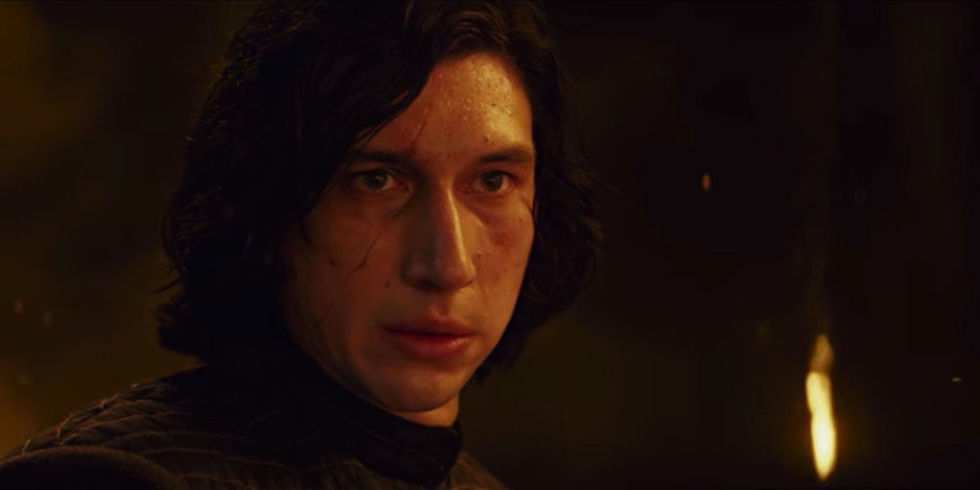
In the Star Wars franchise, which tends to flatten out the unique qualities of actors, Adam Driver manages to bring over his own idiosyncrasies intact. In fact, these traits fit surprisingly well with his character, Kylo Ren. On some level, Ren is just a frustrated young man, rebelling against his parents and their expectations. Driver’s trademark naturalistic performance style emphasises this throughout: not yet an awesome villain, not yet completely lost to the dark side, Ren appears very much human.
[clickToTweet tweet=”‘Driver’s trademark naturalistic performance style emphasises Kylo Ren as a frustrated, rebellious young man throughout: not yet an awesome villain, not yet completely lost to the dark side, Ren appears very much human.'” quote=”‘Driver’s trademark naturalistic performance style emphasises Kylo Ren as a frustrated, rebellious young man throughout: not yet an awesome villain, not yet completely lost to the dark side, Ren appears very much human.'”]
Yet he is at a turning point in his life, where he might decide to join the Dark Side and become something more sinister: Driver’s agitated performance communicates an unmistakable sense of disquiet and anguish. Always slightly off, his movements and the intonations in his voice subtly hint at the way Ren, in every aspect of his being, strives to deny who he truly is and run away from his roots. His chin trembling, his jaw severely clenched, his eyes alternatively angry and pleading, Ren looks as though he might explode in rage at any moment. If the rare times he appears to let go of his anger feel like such blessings, this is entirely due to Driver’s impressive ability to turn what could be a rather cliched character into a transcendent presence. – EL
Henrik Raefelsen, Thelma

The first scene in Joachim Trier’s Thelma sets the tone for the whole film. A father and his young daughter are out hunting, alone in the wintry forest. The father unslings his rifle and aims at a deer. As the girl stares at the doe, captivated, her father’s aim shifts. For a long moment, he sights down the barrel, pointed at the back of his little girl’s head.
What could make a father wish to harm his child? That question hangs over the first half of Thelma, as we watch the adult Thelma (Eili Harboe) and her father, Trond (Henrik Raefelsen), interact. In this horror film, supernatural powers are a plot device for addressing their toxic parent-child relationship, which is at once genuinely supportive and unhealthily dependent. Newcomer Harboe earned accolades for her sensitive lead performance, but it’s her interactions with Raefelsen that provide a springboard for her performance and get to the heart of the film.
Raefelsen’s understated performance reveals Trond as a monster, but a loving one. Even at his most supportive, we sense a sinister edge to his interactions with Thelma. Early in the film, Thelma leans her head on his shoulder and confesses her loneliness. He doesn’t hug her, but he doesn’t need to; their easy physical closeness provides just as much comfort and security as his encouragement that people will come to see her worth. But just a scene earlier, Raefelsen used the same mild, even tone to rebuke Thelma sharply for her arrogance. There’s no difference in his manner between the encouraging parent and the authoritarian father cowing his daughter’s confidence. He raises her up and cuts her down without even raising his voice.
This gentle manner is all the more chilling when Trond is at his most monstrous. Concluding that Thelma is simply too dangerous, he proposes to keep his daughter a prisoner in their house and drug her into helplessness for the rest of her life. But as he injects his unwilling daughter with heavy sedatives — a horrifying twist on the image of a father caring for his sick child — Raefelsen portrays Trond as reluctant and almost tender. This, Trond believes, is the only alternative to killing his daughter, which he ultimately cannot bear to do. Raefelsen’s calm manner and soft-spoken tone foreground the affection and closeness of Trond’s relationship with Thelma until it becomes impossible to write Trond off as a simple villain. All of his actions, even his most abusive, spring from misguided love. – MAR
Read our Special Issue on Thelma here >>
Riz Ahmed, Una

As the only sane and well-adjusted person in Una, Riz Ahmed is the odd man out. Ahmed plays Scott, a sweet man who works in the same factory as Una’s (Rooney Mara) childhood molester, Ray (Ben Mendehlson), the site where the pair have their years-in-the-making confrontation — all unbeknownst to Scott.
Scott is attracted to Una from the minute he meets her, and as he’s played by Riz Ahmed, he’s obviously an easy attraction for her, too. But it’s the shock and confusion that plays out on Ahmed’s face — as Una invites herself over to his home for sex, breaks down and manipulates him in the middle of the act, before placing him in the middle of her drama — that makes his performance.
It’s a very reactive part, with Ahmed serving as the audience surrogate. He spends his few scenes surprised by his good luck in landing Una’s interest and simultaneously trying to work out both how he’s managed it, and then why Una is behaving so strangely. It’s a tough line to walk: Scott has to be charming, but not so charming that he’d easily resist Una’s charms. He has to innocent enough to get caught in her web, but smart enough to figure out everything that’s happening without being told anything. We’re constantly watching Ahmed think, puzzling out the contradictory information he’s given, and trying to understand the complicated woman he thinks he’s interested in. – AH
Una is a psychologically complex screen adaptation of Blackbird
As we close out the 2017 film year, we also celebrated unsung work behind the camera in our Best of 2017 series. We took an in-depth look at the best achievements in cinematography, film editing, and costume design. One of our critics picked six of the best performances of the year, some of which were Oscar-nominated and some completely unsung. Finally, as a prelude to the best performances, we took a look at some of the best individual line readings of 2017.

